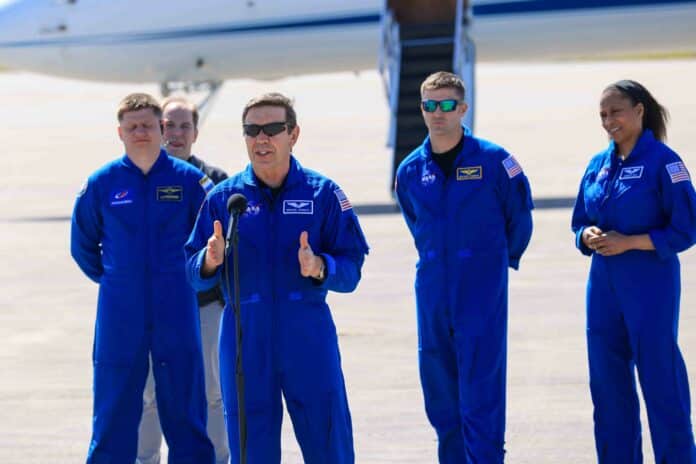Despite days of weather delays and last-minute concerns about a cracked hatch seal, an international crew of four reached orbit Sunday night following a successful launch to the International Space Station. The liftoff of the Crew 8 mission occurred at 10:53 p.m. from Launch Complex 39A at NASA’s Kennedy Space Center in Florida. The launch marked SpaceX’s eighth commercial crew rotation mission on behalf of NASA to the space station and the 50th astronaut to be launched by the company since 2020.

In a few tense moments during the last hour of the countdown, engineers investigated a reported crack in one of the hatch’s seals but determined the crack did not pose a threat to the crew.
Riding aboard SpaceX’s reusable Crew Dragon module Endeavour, NASA astronauts Matthew Dominick, Michael Barratt, and Jeanette Epps, along with Roscosmos cosmonaut Alexander Grebenkin, headed into space for a six-month science expedition aboard the orbital laboratory. Eight minutes following the spectacular nighttime launch, the rocket’s first stage, a reusable Falcon 9 booster, successfully landed at Cape Canaveral’s Landing Zone 1. (LZ-1).

“What an incredible ride to orbit!” Crew 8 Commander Matthew Dominick, 42, radioed to Space X’s mission control center. “A big thank-you to SpaceX.”
In a nod to his crewmates, who are all younger, NASA veteran and mission pilot Dr. Michael Barrett, 64, said following the launch, “Really honored to fly this new-generation spaceship with this new-generation crew.”
Endeavour successfully docked autonomously to the space station’s Harmony module about 3 a.m. Tuesday, March 5, where the Crew 8 astronauts were welcomed aboard by seven others already on the station.

Matthew Dominick, an accomplished test pilot, is the commander of Crew-8, his first spaceflight since his selection as an astronaut in 2017. During Expedition 70/71 aboard the space station, he will serve as a mission specialist. Follow @dominickmatthew on X.
Michael Barratt is the Crew-8 pilot making his third visit to the space station. In 2009, Barratt served as a flight engineer for Expeditions 19/20 as the station transitioned its standard crew complement from three to six and performed two spacewalks. He flew aboard the space shuttle Discovery in 2011 on STS-133, which delivered the Permanent Multipurpose Module and fourth Express Logistics Carrier. Barratt has spent a total of 212 days in space. During Expedition 70/71, he will serve as a mission specialist.
Dr. Jeanette Epps, Ph.D., is a mission specialist for Crew-8, making her first spaceflight. She worked with the commander and pilot to monitor the spacecraft during the dynamic launch phase and will do the same during the re-entry phase of flight. Epps, who was previously selected for the Expedition 56 mission in 2018, was bumped from that roster late in the launch schedule for administrative reasons, making this flight even more special to her. Epps was selected by NASA as an astronaut in 2009. She will serve as a flight engineer during Expeditions 70/71. Follow @Astro_Jeanette on X.
Roscosmos cosmonaut Alexander Grebekin is flying on his first mission. He will serve as a flight engineer during Expeditions 70/71.
Crew-8 will join the space station’s Expedition 70 crew of NASA astronauts Jasmin Moghbeli and Loral O’Hara, ESA (European Space Agency) astronaut Andreas Mogensen, JAXA (Japan Aerospace Exploration Agency) astronaut Satoshi Furukawa, and Roscosmos cosmonauts Konstantin Borisov, Oleg Kononenko, and Nikolai Chubb. The arrival of Crew 8 brings the number of crew aboard the space station to 11 until Crew-7 members Moghbeli, Mogensen, Furukawa, and Borisov come back to Earth in a few days. Crew-7 launched in August 2023.
“Congratulations to NASA and SpaceX on another successful launch to the International Space Station! On this eighth crew rotation mission, we are once again showing the strength of our commercial partnerships and American ingenuity that will propel us further in the cosmos,” said NASA Administrator Bill Nelson. “Aboard the station, the crew will conduct more than 200 science experiments and technology demonstrations to help fuel this new era of space exploration and benefit humanity here on Earth.”
Crew-8’s mission is to conduct new scientific research to prepare for human exploration beyond low Earth orbit and benefit humanity on Earth. Among over 250 experiments to be carried out by Crew-8 are experiments to study neurodegenerative disorders, shifts in body fluids during spaceflight, and the effects of UV radiation and microgravity on plant growth. The experiments are aimed at gathering data for much longer duration spaceflights such as expeditions to the Moon and Mars as part of NASA’s planned Artemis missions. According to NASA, the physiological science experiments will also advance medical knowledge that can be used to improve life on Earth.
Additionally, the mission will include testing technologies, performing science, and developing the skills needed to operate future commercial destinations in low Earth orbit and explore farther from Earth.
SpaceX has experienced a busy year, accomplishing nearly 100 launches over the previous twelve months, and is targeting 150 launches in 2024.
In response to inquiries regarding the now-frequent and crowded launch schedule appearing to become routine, NASA Administrator Bill Nelson issued a warning against complacency.
“Spaceflight is hard. Spaceflight is risky. … You never want to get into the frame of mind that it is so routine,” he said. “Every time we launch, it’s white-knuckle time, and especially if humans are on top.”

